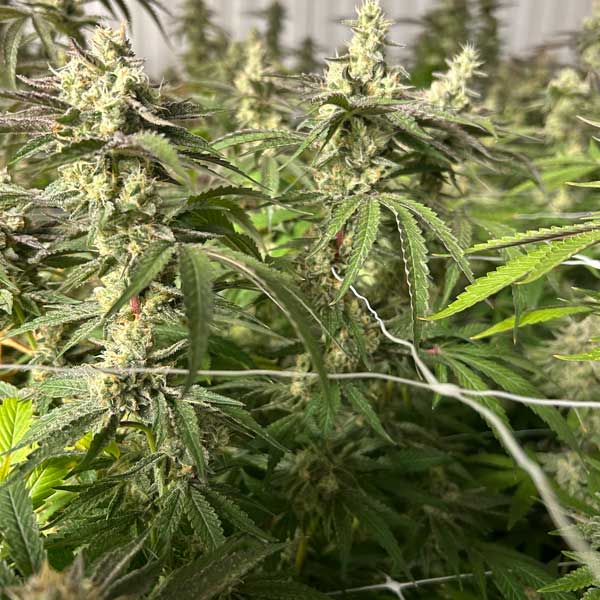If you know anything about cannabis, you’ve probably heard about or experienced the relaxation that ingesting the plant provides. It’s one of the aspects of cannabis that most people are drawn to and appreciate. Cannabis may also help those who suffer from anxiety, especially in social situations.
Anxiety is a normal human emotion, and when we’re anxious, we feel tense or nervous and may have fears about a specific situation or event. Anxiety can manifest itself in physical symptoms like increased heartbeat, a rise in blood pressure and sweating. Anxiety disorder is a psychological disorder, and people who live with it have frequent, intense worries and fears about everyday scenarios.
For some people, cannabis can help alleviate anxiety symptoms; for others, it increases the symptoms. So how can someone with anxiety know if weed will help lessen or increase the symptoms? Let’s explore!

Science Lesson
Here’s some of what we know—cannabis isn’t a single chemical compound. It’s made up of hundreds of different substances. You’re probably familiar with two of them—delta-9-tetrahydrocannabinol (THC) and cannabidiol (CBD). Those are the biggies, but the plant also contains terpenes, which give each strain a specific smell, taste and effect. We’ve talked a little about terpenes in prior blogs. The other compounds identified in marijuana that are chemically related to THC are called cannabinoids.
Cannabinoids, like other pain-relieving meds, interact with individual receptors in the central nervous system and produce a specific effect. Cannabinoids are how cells send, receive, or process messages. But how that message is received depends on the person—gender, physical condition, and other factors play into how you and cannabis dance together.
Every individual reacts differently to cannabis—some people love the smell, while others can’t abide by it. Some people consume just a little and get a potent effect, while others turn to concentrates or more high-potency flower to get a buzz. And that’s why caution needs to be taken when turning to cannabis for anxiety.
Generally, when you ingest a small or personally tolerable amount of cannabis, the plant brings on a feeling of relaxation, a sense of calm or peacefulness, and an increased awareness of your senses—sounds, smells and tastes are more intense. As a result, it can help you feel more relaxed, comfortable and engaged with your surroundings and with the people around you.
Conversely, when you consume too much cannabis—usually from an edible—you may feel overwhelmed, unable to focus, have memory issues, and have trouble with decision-making. You’re likely to feel more anxious instead of less.

Considering Terpenes
Depending on the terpenes in the cannabis strain, you might feel energized or hyper-focused, so terpenes need to be considered.
When looking at cannabis to help with mild social anxiety, you’ll want to find a strain containing terpenes with relaxing properties.
Terpinolene as a terpene is found in apples, tea tree and lilac. In cannabis, it smells fresh—like citrus and pine. It’s being studied for anti-cancer and sedative/anti-anxiety effects.
Myrcene is primarily herbal in its scent. It also might smell like hops and lemongrass. It helps with relaxation and mood-lifting.
Alpha Bisabolol is a common cannabis terpene found in chamomile and has a gentle, sweet flowery scent. It’s soothing for the skin and calms the mind.
Limonene is citrus-scented, so think about fruit peels like orange, lemon, juniper, and peppermint.

How to Find Cannabis Products for Anxiety
The easiest way to find terpenes in cannabis is to look at our website.
ORDER NOW>SHOP ALL> and hit the flower icon, once you’ve navigated here, click on the photo of the bud, and some of the growers will provide information about what the terpenes are and the strain’s attributes. Look for something that emphasizes relaxation, anxiety or stress.

Because terpene information isn’t always available, look to something in the category of indica. Anecdotal experiences tell us that Indica plants are more soothing than Sativa strains. For some people, Sativa strains tend to be more anxiety-inducing because of their terpenes, and large doses may cause paranoid or anxious thoughts.
The most important thing to consider when trying cannabis to tame your anxiety is to start low and go slow.
Find cannabis flower with the desired terpenes and a lower THC percentage—like in the mid-teens and when you consume, just a couple of hits rather than the whole joint. Or if you’re doing an edible, try something at 2.5 percent to 5 percent THC. We have a few things that fit that bill. Remember that edibles can take up to an hour or more to take effect.
If you’re concerned about stepping out to a party or event after trying cannabis for anxiety—give it a try at home and see how you react. If all goes well, you’ll feel more relaxed, less worried, and happier about your situation—and a bit more chill.
The Pharmhouse team is always happy to provide suggestions on products known to help quell anxiety—just ask!
PS: Inform your healthcare provider that you’re experimenting with cannabis for anxiety, especially if you’re taking any other anti-anxiety meds.





